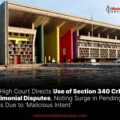
The Court said that appealing against such divorce decrees would undermine the court’s authority, make a mockery of its verdict and amount to contempt of court and perjury.
The Punjab and Haryana High Court recently ruled that a couple who have obtained a mutual consent divorce under the Hindu Marriage Act cannot later challenge the decree simply because they wish to reconcile. Justices Sureshwar Thakur and Sudeepti Sharma noted that such attempts would undermine the court’s authority, trivialize its decision, and amount to contempt of court and perjury.
“Permitting parties to subsequently retract their sworn statements and assert a desire to reconcile, by stating that they have realised their mistake and now they want to live together, would amount/constitute Contempt of Court and perjury,” the Court said further.
The Court observed that divorced couples are allowed to remarry under the Hindu Marriage Act, which imposes no restrictions on them doing so. The High Court was considering an appeal from a couple who had divorced by mutual consent in November 2023, with custody of their young daughter awarded to the mother.
The couple, who had been married since November 2016 and living apart since December 2021, informed the court after their divorce that they had “realized their mistake” and wished to reunite for the sake of their child’s well-being. They requested the court to annul the divorce decree. The High Court examined whether an appeal against a mutual consent divorce under Section 13-B of the Hindu Marriage Act could be permitted under Section 28, taking into account the provisions of the Code of Civil Procedure (CPC).
After examining the laws, the Court highlighted that Section 28A of the Hindu Marriage Act permits appeals for all decrees issued under the Act. It also noted that the procedures and rules for filing and managing these appeals are detailed in the CPC. In this context, the Court explained that since Section 96(3) of the CPC forbids appeals against consent decrees, a divorce granted by mutual consent cannot be contested.
“Since there is a bar under Section 96(3) of CPC that no appeal shall lie from decree passed by the Court with the consent of the parties. Therefore, no appeal shall lie from decree passed by the Court with the consent of the parties under Section 13-B of the Act. Appeal under Section 13-B would be maintainable only on the ground that the consent was obtained by force, fraud or undue influence,” it concluded.
Accordingly, the Court dismissed the appeal.
Advocate Rahul Aggarwal represented the couple.





